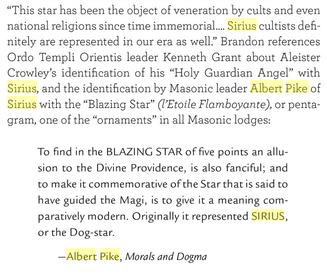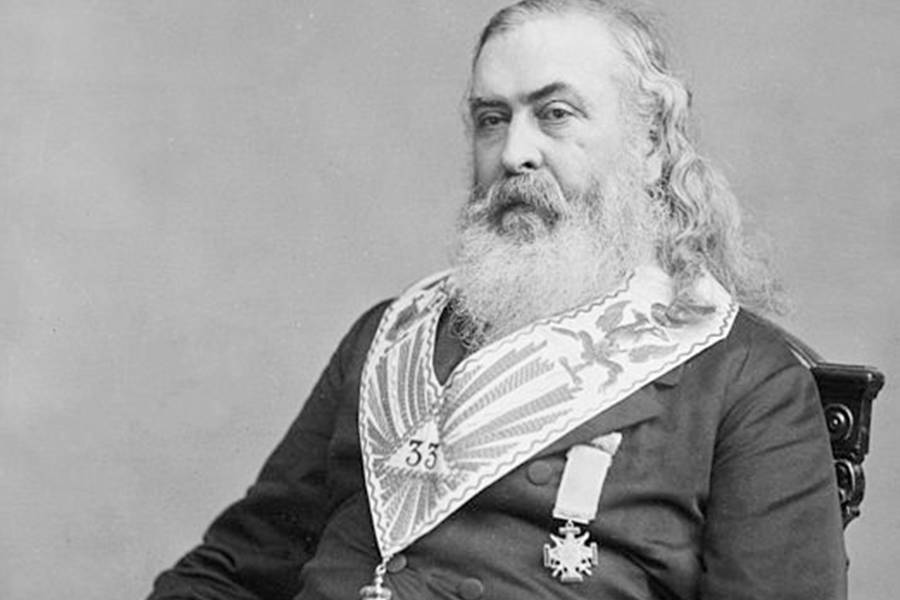It looks like you're using an Ad Blocker.
Please white-list or disable AboveTopSecret.com in your ad-blocking tool.
Thank you.
Some features of ATS will be disabled while you continue to use an ad-blocker.
share:
a reply to: UKTruth
Hello and thank you for your reply. We may disagree on politics but here we find ourselves with mutual interest. I think as you suggest the reason for keeping this hidden is to deny us our spirituality. Its a type of control to sever us with our roots. If you don’t really know who you are you do not know how to act correctly.
Hello and thank you for your reply. We may disagree on politics but here we find ourselves with mutual interest. I think as you suggest the reason for keeping this hidden is to deny us our spirituality. Its a type of control to sever us with our roots. If you don’t really know who you are you do not know how to act correctly.
a reply to: AugustusMasonicus
Sorry to have to do your homework for you. I thought you where the Freemason. Have your heard of Albert Pike I suggest you study his work if it of intrest to you. There is plenty more if you are interested.

Sorry to have to do your homework for you. I thought you where the Freemason. Have your heard of Albert Pike I suggest you study his work if it of intrest to you. There is plenty more if you are interested.

a reply to: AugustusMasonicus
No I am not trying to be obtuse. Your response does not tell you what it is.
..which we owe to the bounty of Divine Providence, which is hieroglyphically represented by the Blazing Star...
No I am not trying to be obtuse. Your response does not tell you what it is.
originally posted by: KKLOCO
All I had to do was google “Sirius in Freemasonry”.
I would include some but, there are literally thousands of links.
Pretty much every link states that the ‘Blazing Star’ represents Sirius in Freemasonry.
Yes its common knowlege in part to work down by the now deceased Freemason A Pike. Peeps should if they want to understand freemasonry do some research into this.
a reply to: AugustusMasonicus
A little more PIke for you. I am not here to convince you. If you are inrested do some digging.

A little more PIke for you. I am not here to convince you. If you are inrested do some digging.

originally posted by: AugustusMasonicus
a reply to: purplemer
You're quoting Albert Pike's opinion, not Masonic ritual like I posted.
He was a high level and educated freemason. He knows his #. Go and have a read. You will never understand freemasonary by ritual alone. Many people that perform it have no idea what they are actually doing. You included by the look of things.

edit on 2-1-2020 by purplemer because: (no reason given)
edit on 2-1-2020 by purplemer because: (no
reason given)
originally posted by: purplemer
He was a high level and educated freemason.
He was the same 'level' as the rest of us, the fact that you even use that word shows how little you know about Masonic structure.
You will never understand freemasonary by ritual alone.
And you'll never understand it at all without one of us masplaining it to you.
a reply to: AugustusMasonicus
You can talk about my dyslexia if you prefer. Normally when peeps start with personal slander it means they are not doing so well in a debate.
Anyway I have called you out. You dont know your stuff. Its bravado on your part.
And you'll never understand it at all without one of us masplaining it to you.
You can talk about my dyslexia if you prefer. Normally when peeps start with personal slander it means they are not doing so well in a debate.
Anyway I have called you out. You dont know your stuff. Its bravado on your part.
originally posted by: purplemer
You can talk about my dyslexia if you prefer.
Is your dyslexia preventing you from understanding the difference between ritual and opinion?
Normally when peeps start with personal slander it means they are not doing so well in a debate.
How is the fact that you're a female and cannot join my lodge slander? It's a reality, kinda like the ritual I posted versus the opinion you posted.
a reply to: AugustusMasonicus
Maybe because you are being obtuse in simply quoting a recently evolved ritual that is not what was the original?
Maybe because you are being obtuse in simply quoting a recently evolved ritual that is not what was the original?
originally posted by: CynConcepts
Maybe because you are being obtuse in simply quoting a recently evolved ritual that is not what was the original?
No, New Jersey's ritual is the oldest in the United States.
The earliest masonic texts each contain some sort of a history of the craft, or mystery, of masonry. The oldest known work of this type, The Halliwell Manuscript, or Regius Poem, dates from between 1390 and 1425. This document has a brief history in its introduction, stating that the "craft of masonry" began with Euclid in Egypt, and came to England in the reign of King Athelstan (born about 894, died 27 October 939)
.[1] Shortly afterwards, the Cooke Manuscript traces masonry to Jabal son of Lamech (Genesis 4: 20–22), and tells how this knowledge came to Euclid, from him to the Children of Israel (while they were in Egypt), and so on through an elaborate path to Athelstan.[2] This myth formed the basis for subsequent manuscript constitutions, all tracing masonry back to biblical times, and fixing its institutional establishment in England during the reign of Athelstan (927–939).[3]
Seems to be me it originated well before the Americas was discovered.
a reply to: CynConcepts
That's Operative Masonry, the ritual wasn't formalized until the early 1700's.
I'm not sure what you're trying to accomplish by posting random things like that.
That's Operative Masonry, the ritual wasn't formalized until the early 1700's.
I'm not sure what you're trying to accomplish by posting random things like that.
a reply to: AugustusMasonicus
The rituals were based off of the original operative formats. The rituals started in Wales England and were brought to America. It was not just created from thin air and imagination. Thus why the operative history does matter.
Edit add: more specifically, The watershed in this process is generally taken to be the formation of the first Grand Lodge in London in 1717.
Thus why I say you are being obtuse in your responses.
The rituals were based off of the original operative formats. The rituals started in Wales England and were brought to America. It was not just created from thin air and imagination. Thus why the operative history does matter.
Edit add: more specifically, The watershed in this process is generally taken to be the formation of the first Grand Lodge in London in 1717.
Thus why I say you are being obtuse in your responses.
edit on 1 2 2020 by CynConcepts because: (no reason given)
originally posted by: AugustusMasonicus
originally posted by: purplemer
He was a high level and educated freemason.
He was the same 'level' as the rest of us, the fact that you even use that word shows how little you know about Masonic structure.
You will never understand freemasonary by ritual alone.
And you'll never understand it at all without one of us masplaining it to you.
Pikes reputation is unprecedented. He was a venerated Freemason. I’d believe what he says over what current mason practices are. This is 150 years ago.
It appears that freemasonry has been watered down, just like most other sects these days.
new topics
-
Ben Habib has Left Reform UK
Regional Politics: 1 hours ago -
Turkey Day Rhyme…
Short Stories: 1 hours ago -
Can someone please translate Biden's speech?
US Political Madness: 2 hours ago -
NIH Chief Confesses COVID Initiatives Were "Completely Made Up " OMG Investigates
Health & Wellness: 2 hours ago -
Awesome Dip Recipe
Food and Cooking: 5 hours ago -
Vladimir Putin's speech at the meeting of the CSTO Collective Security Council
World War Three: 6 hours ago -
Traveling the world with no passport
Social Issues and Civil Unrest: 10 hours ago
top topics
-
Happy Thanksgiving to ATS
General Chit Chat: 14 hours ago, 9 flags -
NIH Chief Confesses COVID Initiatives Were "Completely Made Up " OMG Investigates
Health & Wellness: 2 hours ago, 9 flags -
Traveling the world with no passport
Social Issues and Civil Unrest: 10 hours ago, 6 flags -
Vladimir Putin's speech at the meeting of the CSTO Collective Security Council
World War Three: 6 hours ago, 6 flags -
Can someone please translate Biden's speech?
US Political Madness: 2 hours ago, 6 flags -
Awesome Dip Recipe
Food and Cooking: 5 hours ago, 4 flags -
Ben Habib has Left Reform UK
Regional Politics: 1 hours ago, 3 flags -
Turkey Day Rhyme…
Short Stories: 1 hours ago, 2 flags
active topics
-
Turkey Day Rhyme…
Short Stories • 1 • : FullHeathen -
Vladimir Putin's speech at the meeting of the CSTO Collective Security Council
World War Three • 27 • : Oldcarpy2 -
Ben Habib has Left Reform UK
Regional Politics • 2 • : angelchemuel -
Can someone please translate Biden's speech?
US Political Madness • 6 • : Oldcarpy2 -
Happy Thanksgiving to ATS
General Chit Chat • 12 • : JsnJln -
Trump could make a peaceful American Revolution
US Political Madness • 11 • : stu119 -
D.B. Cooper mystery may be solved
General Conspiracies • 25 • : Arbitrageur -
Petition Calling for General Election at 564,016 and rising Fast
Political Issues • 108 • : angelchemuel -
Awesome Dip Recipe
Food and Cooking • 3 • : Flyingclaydisk -
Trump Presidential Transition Team will not use GSA or Government entities to come to DC
US Political Madness • 20 • : angelchemuel
